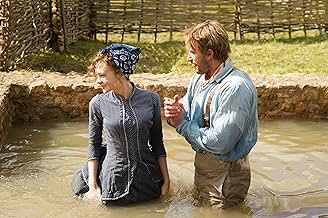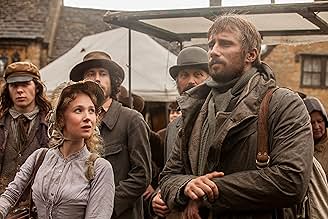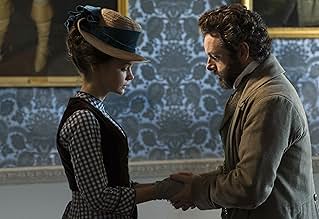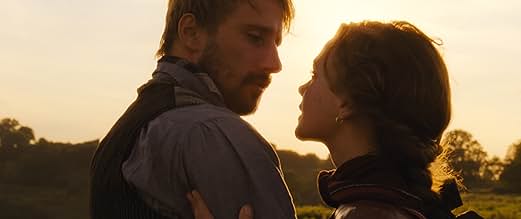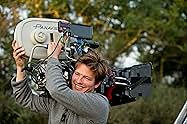Nell'Inghilterra vittoriana, l'indipendente e testarda Bathsheba Everdene attrae tre pretendenti molto diversi: Gabriel Oak, un allevatore di pecore; Frank Troy, uno spericolato sergente; e ... Leggi tuttoNell'Inghilterra vittoriana, l'indipendente e testarda Bathsheba Everdene attrae tre pretendenti molto diversi: Gabriel Oak, un allevatore di pecore; Frank Troy, uno spericolato sergente; e William Boldwood, uno scapolo ricco e maturo.Nell'Inghilterra vittoriana, l'indipendente e testarda Bathsheba Everdene attrae tre pretendenti molto diversi: Gabriel Oak, un allevatore di pecore; Frank Troy, uno spericolato sergente; e William Boldwood, uno scapolo ricco e maturo.
- Regia
- Sceneggiatura
- Star
- Premi
- 2 vittorie e 11 candidature totali
Recensioni in evidenza
Thomas Hardy would make a fortune today writing soap opera period pieces like Far from the Madding Crowd for HBO. That's a compliment because this film is done with such restraint (far fewer gratuitous country-beautiful shots and more close ups) that it could have been set in any era and the human condition would be the same.
Besides its fidelity to the spirit of Hardy's typically bright, tough farm girl ("I have an education. Nothing else"), class division, complicated loves, Far offers a heroine, Bathsheba (well-cast, crooked smiling Mulligan) far ahead of her time (See the above quote). Although she doesn't want for suitors, she doesn't want to be subjugated by a husband either ("being some man's property"). Katherine Hepburn could have played this role.
As life and Hardy would have it, chance and human nature have their own agendas, and Bathsheba makes bad decisions based on youthful passion and naiveté—Hardy, frequently a figurative scold, makes sure she pays amply for her mistakes before he sets the balance right between fortune and misfortune. His more famous Tess of the d'Urbervilles is the finest example of the strong-willed, suffering heroine, who, because of weak men, is mercilessly buffeted by the fates and her own weakness.
One of Bathsheba's suitors, the painfully shy William Boldwood (Michael Sheen), personifies the aging Victorian society, bound in property and loneliness; to her he importunes, "I want very much to protect you for the rest of your life." However, the temporary prize of Bathsheba is given to the crimson-uniformed rake, Sergeant Francis Troy (Tom Sturridge), another character waiting for Hardy's punishment.
The obvious right guy for her is farmer Gabriel Oak (Matthias Schoenaerts), whose steadfast love for the heroine could only be compared to Job's suffering. To her he always speaks honestly and lovingly: "I'm not going to tell stories just to please you. You can be sure of that."
Far from the Madding Crowd is a crowd pleaser. Hardy would have loved the adaptation.
The final whitewashing of this script's plot is the moral omittance of her not speaking up for Boldwood. Rescued from a threatening situation it is her testimony that could save a life, but as before she walks away. This script has her succeeding, but the film leaves little sense of the destruction she left in her path.
Carey Mulligan delivers a brilliant performance as the nearly modern woman in a world still ruled by men. She's a complicated heroine and could be derided for her uncertain love life. The three men deliver the needed personality. Michael Sheen is probably the least like his distant socially awkward character. I would have liked the movie to concentrate more on Oak but that wouldn't be the story. This is a lovely addition to the classic.
Bathsheba is a magnet to men with her feisty and independent behaviour, and the film documents the "love square" between her and three men in her life: Gabriel Oak (Matthias Schoenaerts), the hunk of a farm manager; William Boldwood (Michael Sheen), the wealthy neighbouring landowner; and Sergeant Troy (Tom Sturridge), a dashing Han-Solo style rogue, flash-as-you-like in his scarlet army uniform.
In reviewing this film I need to declare a couple of loves.
Firstly, Dorset. Of all the English counties, this has to be one of the most glorious. Green rolling hills, dramatic coastline such as that at Golden Cap (featured in the film), quaint villages and – most importantly in this context – gorgeously photogenic. Hopefully, this might tempt more visitors to stop there rather than 'driving on through' to Devon and Cornwall for their holidays.
Secondly, and with apologies to the wife, Carey Mulligan. To be clear, this is not a sordid sexually-motivated affair (although there was THAT shower-scene in "Shame") but a deep love of her acting talents and screen presence. This is a love affair long in the making, beginning ten years ago with her startling presence in Bleak House at the age of 20 (looking much, much younger); her stunning minx-like Dr Who performance as Sally Sparrow in "Blink"; and on through her breakout movie performance in "An Education" in 2009.
Where Mulligan excels is in roles where she can play a strong, confident and independent woman, so the role of Bathsheba is perfect for her. She is utterly believable as the 1870's landowner holding her own against the men-folk, and even pulling off the somewhat out-of-character plot twist half-way through the film.
The supporting cast is also excellent. The ever-reliable Sheen ("The Queen"; "Frost/Nixon") delivers a heart-breaking performance as the love-lorn Boldwood; Schoenaerts (recently in "Suite Française") is manly enough with a scythe to no doubt set female hearts a flutter; and Sturridge is deliciously unpleasant in his powerful role.
Above all, this is just a crackingly good story, through David ("One Day") Nicholls's tight screenplay. If you decide to avoid this film because it is "old stuff", think again. The roller-coaster ride of the plot gives UK and US 'soaps' a good run for their money in the drama stakes, and the denouement is both surprising and satisfying.
Direction is by the relatively unknown (to me at least) Thomas Vinterberg ("The Hunt"), but big kudos needs to go to Vinterburg's collaborator Charlotte Bruus Christensen for the stunning cinematography: some of the scenes (notably the harvesting scene towards the end of the movie) are bucolically gorgeous.
Also worth noting is the soundtrack by the brilliant but sparingly used Craig Armstrong ("Love Actually", "The Great Gatsby") which is luscious and suits the film to a tee. The woodland rendezvous scene makes your hair stand on end and this is largely down to the music combined with Claire Simpson's excellent editing.
I struggle to find aspects to criticise. I was gripped, and suitably shocked at the right moments, which is just what you want for a good night out at the movies. Having already praised the cinematography, one gripe I would have is with the lens flare at the end of the film (natural this time, rather than of the JJ Abrams variety) which was annoyingly distracting to me in the closing scene: but I recognise this is a personal complaint that I might be alone in.
Just a word of warning as well for animal lovers: that despite it being a UK 12A certificate, there are some pretty torrid scenes with sheep and a dog that might upset sensitive viewers - perhaps it should have been given a "Ewe" certificate (that joke will only work for UK readers!).
In summary, this is a treat for a more elderly audience, but should be a must see for audiences of all ages as a rollicking good tale, well told and beautifully shot.
(If you enjoyed this review, please see the multi-media version at bob-the-movie-man.com and enter your email address to receive future reviews. Thanks.)
Vinterberg has set himself a difficult task. Schlesinger's film was a landmark of British cinema, marking the beginning of what I have come to think of the "heritage cinema" style of film-making. In my eyes at least, and I suspect in the eyes of many others, it has become the definitive version; I cannot re-read the novel- it is a favourite of mine and I have read it several times- without picturing Bathsheba as Julie Christie, Gabriel as Alan Bates, Troy as Terence Stamp or Boldwood as Peter Finch.
Like Schlesinger, Vinterberg sticks fairly closely to Hardy's story, although of necessity some minor episodes have had to be omitted. There were one or two touches I didn't really care for, such as the scene where Troy grabs Bathsheba by the crotch. In the novel Hardy describes Troy's seduction of the young woman with great delicacy. This is not just a question of Victorian prudery, but also of psychological realism. A girl as independent and determined as Bathsheba would have resented such a crude approach; had Troy attempted it he would doubtless have got his face slapped for his pains. I also felt that this version rather inflated the social status of both Bathsheba and Boldwood. In the novel both are prosperous farmers, but nothing more. Here they live in the sort of style which would suggest she is the Lady of the Manor and he a wealthy aristocrat.
Hardy's novel is, among other things, a celebration of the English countryside, and this aspect is brought out well here. Like Schlesinger's, the film is visually attractive with some striking photography of the rural landscapes, often seen bathed in a soft, golden glow. On the acting side I was most impressed by Matthias Schoenaerts as Gabriel. His interpretation is rather different from Bates's, making his character perhaps more genteel and less rough-hewn, but still a man of great sensitivity and integrity. The Belgian-born Schoenaerts speaks flawless English with no hint of a foreign inflection, although it is noticeable that, unlike Bates, he does not attempt a West Country accent. Possibly wisely- English regional accents can be notoriously difficult for foreign-born actors.
On the other hand, I was less impressed by Tom Sturridge who makes an unmemorable Troy, lacking the roguishness and devil-may-care charm which Stamp brought to the role. Michael Sheen is better as Boldwood, but never quite matches Finch's desperate, nervous intensity. The difference, perhaps, is that Sheen's Boldwood is obsessed by Bathsheba whereas Finch's is almost literally possessed by her. Carey Mulligan has plenty of experience in films of this type, having inherited the crown formerly worn by Helena Bonham-Carter and Keira Knightley, that of Reigning Queen of Period Drama. She has been praised for her performance here, but personally I preferred Christie's rather more imperious and headstrong interpretation. Vinterberg's film is a generally solid, well- made piece of period drama, but for me it will not replace Schlesinger's as the definitive version. 7/10
Lo sapevi?
- QuizAsked who she would have chosen if she had these three very different suitors in real life, Carey Mulligan chuckled as she quickly replied, "I probably would have gone for the guy with the baby lamb (Gabriel) in the first 20 minutes of the film."
- BlooperIn the final scene when Gabriel leaves the farm he is wearing white trousers and white shirt with a dark waistcoat but shortly later when B catches up with him he is dressed in completely different clothes.
- Citazioni
Bathsheba Everdene: It is difficult for a woman to define her feelings in a language chiefly made by men to express theirs.
I più visti
Dettagli
- Data di uscita
- Paesi di origine
- Sito ufficiale
- Lingua
- Celebre anche come
- Lejos del mundanal ruido
- Luoghi delle riprese
- Mapperton, Beaminster, Dorset, Inghilterra, Regno Unito(Bathsheba Everdene's farm)
- Aziende produttrici
- Vedi altri crediti dell’azienda su IMDbPro
Botteghino
- Budget
- 12.000.000 £ (previsto)
- Lordo Stati Uniti e Canada
- 12.236.500 USD
- Fine settimana di apertura Stati Uniti e Canada
- 164.985 USD
- 3 mag 2015
- Lordo in tutto il mondo
- 30.599.369 USD
- Tempo di esecuzione1 ora 59 minuti
- Colore
- Mix di suoni
- Proporzioni
- 2.35 : 1
Contribuisci a questa pagina








